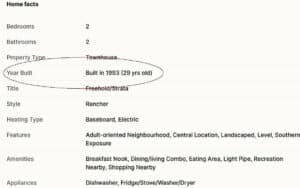
What To Think About While Weighing Options
The Canadian real estate market typically has a mix of older and newer homes. Which leaves many first-time buyers wondering which option will give them the best value. When deciding whether an old or new home is right for you, there are many factors to consider.
How To Know How Old The House Is?
The first step, of course, is determining just how old a house is. Luckily, this has a simple solution. Just go to the home’s online listing on a site like rew.ca, or if you’re working with a realtor, you likely get customized listings emailed to you.
Open the listing, then scroll to the details at the bottom and look for headings like “Year Built,” or “Built In.”

Which Is Cheaper?
If you’re looking for a home within a certain price range, you’ll likely see both old and new houses on the market. The question is not so much which is cheaper, but how you want to spend the money you have, and what your priorities are.
With older homes, you tend to get more house and outdoor space for your money. Since land and building materials were less expensive in the past, older homes and yards or patios tend to be larger.
Of course, the downside is that you’ll need to budget for repairs and maintenance.
New homes and outdoor spaces are smaller. But you get more peace of mind. Especially if you are considering a new build, which will have warranties on it.
Pros of Buying A New House
New houses, whether they are brand new builds, or less than 10 years old, have many selling points.
No Worries
One new house benefit is peace of mind. With a new home, you don’t need to worry about the roof or the wiring. You can rest assured it was built to modern standards. With brand new homes, or homes less than 5 years old, you won’t even need to worry about the appliances for a while.
Closet Space
New homes are built with modern owners in mind, and generally have more closet space. If your wardrobe puts Carrie Bradshaw to shame, or if you need lots of room to store your children’s toys, a newer home might be a better option for you.
Modern Conveniences
Newer homes also have plenty of outlets for electronics, and space for appliances like dishwashers and microwaves.
Energy Efficiency
New homes are also much more energy efficient. They retain heat better in the winter, so you can save money on your utility bills.
Escape Bidding Wars
Buying a new build can allow you to opt out of bidding wars. When there are multiple offers on older homes, the price can skyrocket. If you buy from the builder, the price is fixed and there is less competition from other buyers.
Cons Of Buying A New House
Of course, there are also downsides to buying new homes.
Size
As previously mentioned, on average, new homes tend to be smaller than older ones. Small open-plan kitchens, and smaller living rooms are common.
Back yards or patios also tend to be smaller. If you dream of having a large yard, this may not be your best option.
Delays
If you’re considering a new build, remember that timelines can change. Many people excitedly opt into a new development, expecting to move within a year, only to wait longer than anticipated. In the current climate, shortages of building materials and labour can lead to longer wait times.
Unknown Quality
Even though brand new homes are built to good standards, problems can appear over time. No one has ever lived in the home, so no one knows what the problems may be. Sometimes, cracks in the foundation can appear as the home settles.
Even if the home is under warranty, building companies can drag their feet when it comes to repairs.
Benefits of Buying an Old House
While it may seem like old homes don’t have much going for them, they do have their benefits.
Space
As previously discussed, a key old house benefit is the space. Areas like living rooms and kitchens are typically larger in old homes, and so are back yards and patios.
Character
Older houses were built with different aesthetics in mind, and can have charm that new houses can’t beat.
If features like crown moulding, real hardwood floors, or fireplaces are important to you, then you may want to consider an older home.
Location
The neighbourhoods with older homes tend to be more established. The trees and other landscaping features are also fully matured.
Durability
Even though new houses are built to current standards, some old houses have better craftsmanship such as thick foundations and masonry walls.
Drawbacks Of Buying An Old House
Old houses, of course, also have their downsides.
Repairs
Old houses are – old and may require repairs that can get very expensive. Replacing the roof, for example, can cost tens of thousands of dollars.
They can also have toxic materials, like asbestos in the walls, or lead in paint that must be removed. These upgrades can also be extremely expensive.
If the electrical systems haven’t been updated, you may be facing another costly repair.
As a result, it’s extremely important to have proper inspections and ask lots of questions when buying an older home.
Poor Insulation
The standards for energy efficiency and insulation weren’t as good in the past. Old houses can be drafty as a result. You may need to budget for upgrades like new or better insulated windows.
Not Up To Modern Standards
Older houses also have fewer electrical outlets, and may not have space for appliances like dishwashers and microwaves. If these are important to you, be sure to check the number of outlets in each room, and for appliances in the kitchen, during the open house.
Fewer Bathrooms and Closets
Expectations have changed. Older houses normally don’t have as many bathrooms and closets. If you don’t mind sharing a bathroom, or buying wardrobes, this may not be an issue for you.
Can You Get Both?
While many buyers do eventually choose between old or new houses, it is possible to get the best of both worlds.
Older houses that have been stripped to the boards (as they say) and fully remodeled, offer the character and charm of an old house, with all the benefits of new houses. These are rarer, but they do exist. Count yourself lucky if you find one, and make sure to have an inspection to ensure the renovations were high quality.
The other option, of course, is to buy an old house and have it remodeled.
Key Takeaways
- Carefully consider what your priorities and deal-breakers are when looking for a home.
- Older homes typically offer more living and outdoor space, but can also need costly repairs.
- New homes boast modern conveniences and require less maintenance up-front.
Are you wondering what types of homes are in your ideal neighborhood? Contact us today, and we can give you current, sound advice on the state of the market.


